French PM Sebastien Lecornu resigns after just weeks in office, plunging France deeper in crisis
President Emmanuel Macron announced on Monday that he accepted the resignation of his close ally Lecornu, following a series of record lows in opinion polls.

France: With just weeks after taking office and only hours after introducing his new cabinet, French Prime Minister Sebastien Lecornu officially stepped down further deepening the country’s long-running political crisis while marking one of the shortest tenures in modern French politics.
President Emmanuel Macron stated on Monday that he accepted his close ally Lecornu's resignation after he had been constantly hitting record lows on opinion polls.
Lecornu was reportedly appointed as the fourth Prime Minister only about nearly a month ago, replacing his predecessor, François Bayrou.
Sky's Europe correspondent @AliBunkallSky says Emmanuel Macron 'faces no good options' as French Prime Minister Sebastien Lecornu resigns less than 24 hours after forming a cabinet.
— Sky News (@SkyNews) October 6, 2025
🔗 Read more: https://t.co/NFtpzwDshx pic.twitter.com/MQZ1PR8p06
Despite his September appointment, Lecornu recently came under intense pressure as he tried to pass a budget in an already fractured French Parliament that is under a debt crisis.
On Sunday evening, Lecornu reportedly named his ministers, with the lineup including many of whom had served in the previous government which only brought ridicule from supporters and opponents alike.
With his decision to bring back former Finance Minister Bruno Le Maire as defence minister being especially unpopular as many agreed that it was under Le Maire’s watch that the country’s public deficit soared.
While speaking outside the office of the Prime Minister, Lecornu said that he was willing to compromise however each political party wanted their entire programme to be adopted by another political party.
Analysts speculate on French President Emmanuel Macron's next moves after Prime Minister Sebastien Lecornu's sudden resignation https://t.co/bpfTbXFyfZ pic.twitter.com/b3cbkZfGaD
— Reuters (@Reuters) October 7, 2025
Furthermore, Le Marie also withdrew from the planned appointment on Monday citing on X that his appointment had brought about incomprehensible false and disproportionate reactions from some quarters.
He further noted that he hopes with his withdrawal, discussions will once again resume with the view aimed at forming a new government which France now needs.
French politics have been in disarray since Macron called snap elections last year, resulting in a deeply fragmented legislature and political impasse. Far-right and left-wing lawmakers hold over 320 seats in the National Assembly, while centrists and allied conservatives hold 210, with no party having an overall majority, making it challenging to pass legislation.
Although a fresh twist comes into play as allegedly Macron had reportedly tasked the outgoing prime minister on Monday to hold a last-ditch talk with the other political parties by Wednesday evening to define the correct platform for action and stability for the country.
Author Profile
Monika Walker is a senior journalist specializing in regional and international politics, offering in-depth analysis on governance, diplomacy, and key global developments. With a degree in International Journalism, she is dedicated to amplifying underrepresented voices through factual reporting. She also covers world news across every genre, providing readers with balanced and timely insights that connect the Caribbean to global conversations.









